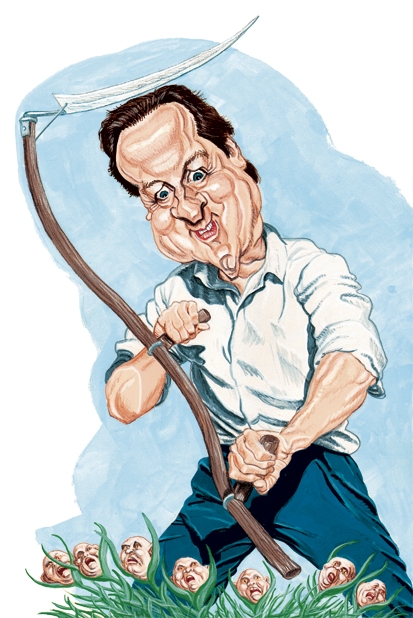We asked Daniel Hannan, Lord Tebbit and historian Andrew Roberts what – if anything – David Cameron could do to rescue his party. Here’s what they had to say:
Daniel Hannan, MEP
At this stage in the Parliament, there are no legislative tricks to pull out of the hat. In any case, as far as policy goes, David Cameron has got the basics right: lower spending, welfare reform, free schools, support for enterprise.
But it all risks being thrown away because of a divided Centre-Right vote. Ukip will do to the Conservatives what the SDP did to Labour 30 years ago. Our first-past-the-post system doesn’t allow space for two competing parties on the same side of the political spectrum. Think of the result at the Eastleigh by-election. Two Right-of-Centre, Eurosceptic candidates, standing on virtually identical platforms, secured 53 per cent of the vote between them and both lost, leaving a Euro-integrationist Liberal Democrat to win the seat with 32 per cent. Multiply Eastleigh by 50 or 100 and you give Ed Miliband a comfortable majority on a paltry share of the vote.
Both Ukip and the Conservatives have ruled out a formal pact. But some form of accommodation, at least in the most marginal seats, is the logical consequence of our electoral system. Foreign observers are usually incredulous that it hasn’t already happened. The thing holding it back is not electoral calculation, but animosity – or, on the Tory side, a kind of political fastidiousness that borders almost on snobbery.
If Balls and Miliband get in again, intent on emptying our Treasury, reversing the welfare reforms and, not least, cancelling our in/out referendum – if all this happens simply because of personal rivalries, it will reflect badly on all concerned.
Lord Tebbit
Especially with the outcome of the Scottish referendum in doubt, there is a lot at stake for Mr Cameron. He could have declined to oppose Mr Carswell at the Clacton by-election. Having ruled that out the Tories must win, or his own position might be at risk.
He could try to undermine Ukip’s campaign by bringing forward a referendum bill – challenging Lib Dems and Labour to defeat it – and by setting out the essential Treaty changes without which he would campaign for Brexit at the referendum
That might be seen as a sign of weakness, just giving in to pressure from Ukip rather than a genuine response to recent events in Brussels. I think he will probably continue to rely on the theme, ‘If you vote Ukip you’ll get Labour and no referendum’, hoping to win by a big enough majority to shore up his position.
It is a high-risk tactic, but there are no low risk ones.
Andrew Roberts
David Cameron once saved my life from a school of Portuguese man’o’war jellyfish, so now’s the time for me to save his political life with this advice: Do Nothing. The British people are a fair-minded lot; they will give you another term in office because you and George Osborne have delivered the best growth rates in Europe despite the monstrous overspending and boom-bust of the Blair-Brown years. Every newly incoming ministry since the war has been re-elected – except that of Ted Heath, which broke all the rules anyhow – and your one will be too. The old motto from your wing of the Tory party, ‘Trust the people’, will see you through.
Douglas Carswell is an intelligent man who has made a stupid mistake. Whether he gets re-elected for Ukip, and however many Tory MPs follow him if he does, the electorate knows that if it wants a referendum on Europe it has to vote Tory. Clacton and everywhere else will revert to serious rather than protest votes in the general election, because that is the time that the British people sober up and make serious choices for the future. They will support the prime minister who is calm in crises, doesn’t offer new punitive taxes, promises them a referendum on Europe, and isn’t Ed Miliband. Which is you, David. To over-react to the Ukip threat now would undermine the first of these attributes, and is not a mistake your hero Harold Macmillan would have made.






Comments